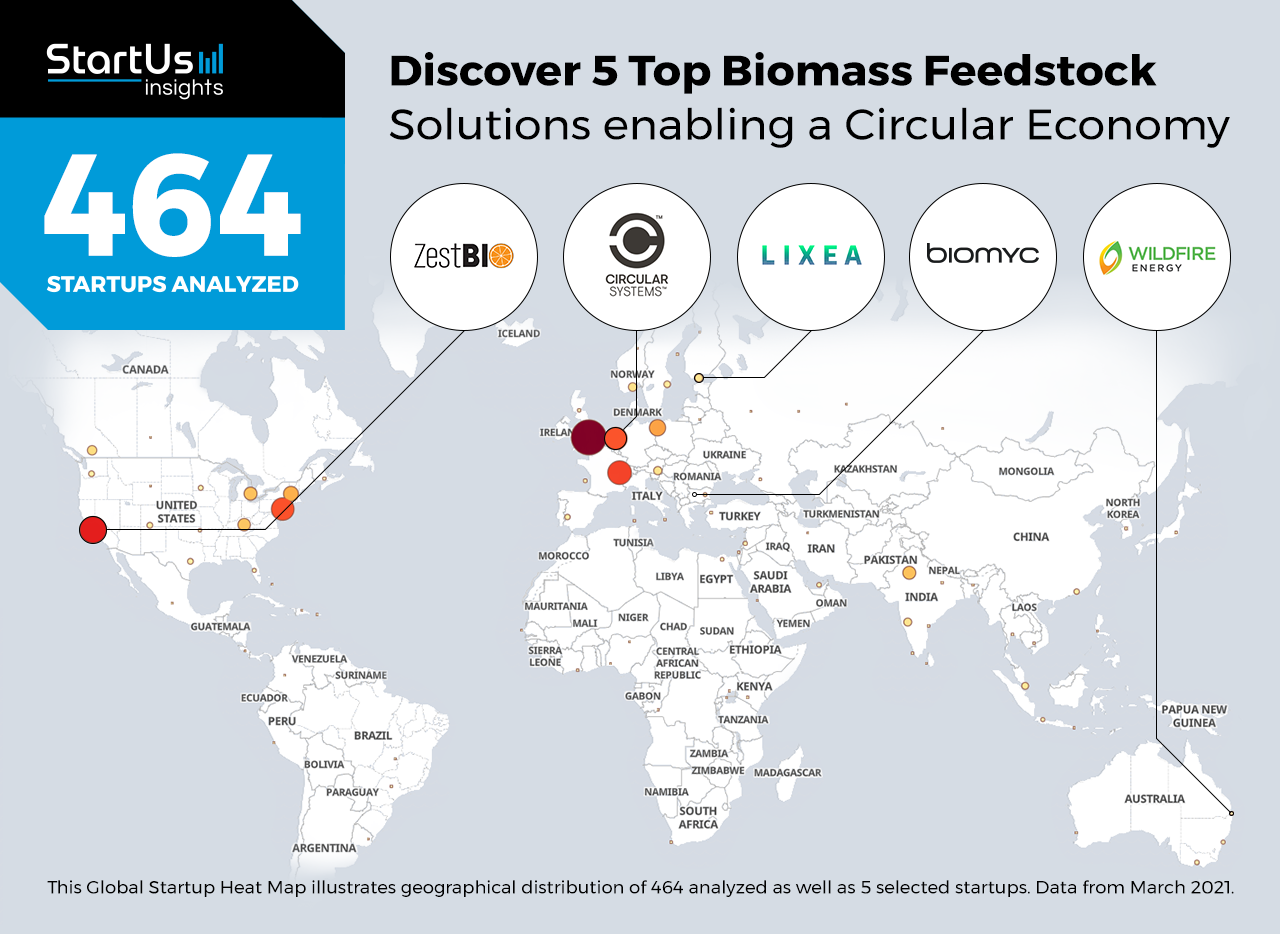Staying ahead of the technology curve means strengthening your competitive advantage. That is why we give you data-driven innovation insights into the agriculture industry. This time, you get to discover 5 hand-picked biomass feedstock solutions.
Global Startup Heat Map highlights 5 Top Biomass Feedstock Solutions out of 464
The insights of this data-driven analysis are derived from the Big Data & Artificial Intelligence-powered StartUs Insights Discovery Platform, covering 1.379.000+ startups & scaleups globally. The platform gives you an exhaustive overview of emerging technologies & relevant startups within a specific field in just a few clicks.
The Global Startup Heat Map below reveals the distribution of the 464 exemplary startups & scaleups we analyzed for this research. Further, it highlights 5 AgriTech startups that we hand-picked based on criteria such as founding year, location, funding raised, and more. You get to explore the solutions of these 5 startups & scaleups in this report. For insights on the other 459 biomass feedstock solutions, get in touch.
Circular Systems develops Waste-to-Fiber Products
Synthetic fibers are derived from petrochemicals and contribute to massive CO2 emissions in the textile industry. Even natural fibers like cotton have a significant carbon footprint. However, agricultural waste streams consist of many products such as hemp and coconut that are rich in fibers. That is why apparel companies are utilizing residue from agri-waste to develop sustainable fibers.
Circular Systems is a Dutch startup developing waste-to-fiber products for the circular economy. Its solution Agraloop transforms agricultural waste into BioFibre for use in yarn and textiles. The platform also generates the bioenergy to run the mill, as well as creates organic soil amendments. Texloop, the startup’s platform, enables the reclamation of post-industrial and consumer textile waste. These regenerative solutions minimize water usage and emissions in the fashion industry.
Wildfire Energy works on Biomass Gasification Technology
When biomass waste ends up in landfills, it contributes to sustained methane emissions increase over a long time. Capturing this methane and redirecting it for energy projects has a lower impact than just letting it escape. Gasification technologies convert biomass directly into methane, as well as other gases such as hydrogen or carbon dioxide, at temperatures above 600°C. This enables efficient conversion of feedstock and methane capture.
Australian startup Wildfire Energy provides biomass gasification technology for waste-to-energy applications. The startup’s Moving Injection Horizontal Gasification technology moves the air to the feedstock, unlike other gasification technologies that move the feedstock to the air. This eliminates the need for feedstock pre-treatment and improves conversion efficiency.
biomyc offers Biodegradable Materials
While packaging solutions like plastics and paper are generally recyclable, consumers do not commonly recycle them when they are soiled with foods. Moreover, there is a growing demand for sustainable packaging solutions to minimize the environmental impact of plastics. This is why startups produce biodegradable packaging materials from biomass feedstock.
Bulgarian startup biomyc turns agricultural residues into low-cost, eco-friendly sustainable packaging materials. The startup’s mushroom material combines agricultural residues and mushroom roots to build packaging solutions that provide extra thermal and impact protection. It also offers paper pulp packaging made from recycled paper and wood sawdust.
Lixea utilizes Lignocellulosic Biomass Feedstock
The agriculture and forestry sectors generate considerable amounts of lignocellulosic waste such as wheat straw or sawmill. However, complex polymers in the lignocellulosic feedstock aren’t easily amenable to enzymatic conversion. As a result, pre-treatment steps are generally required to break down cellulose and lignin. Hence CleanTech startups and companies alike develop methods to convert this waste into bioethanol as a cleaner alternative to fossil fuels.
Lixea is an Estonian startup developing a biomass fractionation process to utilize lignocellulosic biomass. The startup’s BioFlex process uses low-cost ionic liquids to drive sustainable conversion of wood products into a cleaner alternative to petrochemicals. The process utilizes waste wood, agricultural byproducts, and sustainably grown biomass. It works with all lignocellulosic biomass types, ranging from softwoods and hardwoods to heavy metal contaminated wood.
ZestBio provides Agricultural Waste Upcycling solutions
Agricultural waste from food processing companies generally ends up in landfills or incinerators. This contributes to carbon emissions in food & agriculture. Waste upcycling solutions lower carbon emissions by redirecting the waste into other useful products. By providing additional income streams, these solutions provide profitability in addition to sustainability.
US-based startup ZestBio provides agricultural waste upcycling solutions. The startup’s cell-based bioconversion platform upgrades industrial fruit and vegetable processing waste into valuable chemicals. It manufactures sustainable cleaning ingredients, bio-based polymers, and specialty chemicals from waste like citrus peels, potato peels, grape pomace, and sugar beet pulp.
Discover more AgriTech Startups
AgriTech startups such as the examples highlighted in this report focus on Artificial Intelligence, the Internet of Things as well as drones. While all of these technologies play a major role in advancing agriculture, they only represent the tip of the iceberg. To explore more AgriTech technologies, simply get in touch to let us look into your areas of interest. For a more general overview, you can download our free AgriTech Innovation Report to save your time and improve strategic decision-making.









